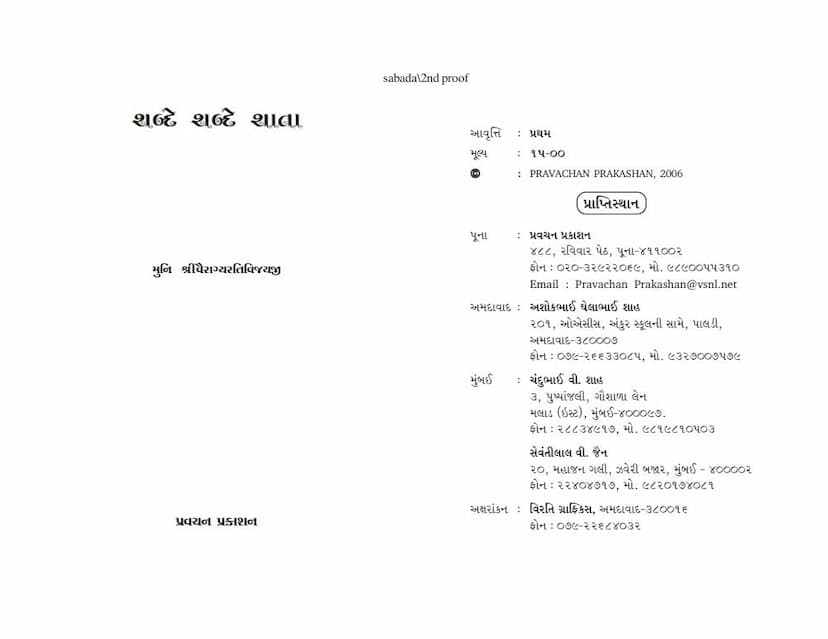Shabde Shabde Shata
Added to library: September 2, 2025

Summary
This is a comprehensive summary of the Jain text "Shabde Shabde Shata" by Vairagyarativijay, published by Pravachan Prakashan Puna:
Book Title: Shabde Shabde Shata (Word by Word Hundred) Author: Muni Shri Vairagyarativijayji Publisher: Pravachan Prakashan, Pune First Edition: 2006 Value: ₹15.00
Overview: "Shabde Shabde Shata" is a compilation of excerpts from discourses delivered by Pujya Muni Pravar Shri Vairagyarativijayji during the Varsaavas (monsoon retreat) of 2061 V.S. in Disa (Nemnathnagar). These discourses, based on the Lalitvistara scriptures, were appreciated not only by Jain followers but also by many non-Jain dignitaries. Partial excerpts were published daily in the Banaskantha edition of the daily newspaper 'Divya Bhaskar'. This booklet is a collection of those excerpts. The publication aims to convey profound spiritual insights and solutions to life's problems through powerful words.
Key Themes and Content:
The book is structured as a collection of short, impactful points or "shatakas" (hundreds of sayings), covering a wide range of spiritual and ethical topics relevant to Jainism and overall human well-being. While a detailed summary of every single point is beyond the scope of this format, the overarching themes and the essence of the teachings can be categorized as follows:
-
The Importance of Words and Speech:
- Emphasis on the power of words to transform the mind and leave a lasting impression.
- The value of listening and speaking thoughtfully.
- The detrimental effects of negative speech, slander, and criticism.
-
Overcoming Ego (Abhiman) and Selfishness (Swaarth):
- Ego is depicted as fragile, the root of all sins, and a barrier to spiritual progress.
- Selfishness is compared to cancer affecting good intentions.
- The book suggests ways to overcome ego, such as being a good listener and considering others first.
-
The Nature of Happiness and Success:
- True happiness comes from the soul, not from external possessions or achievements.
- Success is often mistaken for happiness, but they are distinct. Success is a situation, while happiness is an inner state.
- The importance of detachment (asakti) and avoiding the pitfalls of worldly desires.
-
Cultivating Virtues and Right Conduct:
- Simplicity (Saralta): Identified as the root of contentment.
- Faith (Shraddha): Possesses the power to purify intellect.
- Diligence and Devotion: Sadhana requires resolve and dedication.
- Moral conduct (Sadachar): The foundation of popularity.
- Equanimity: Accepting success and failure with calmness.
- Friendship (Maitri): A relationship that connects the soul to the divine.
-
Understanding the Self and the Divine:
- The mind is central to spiritual progress; controlling it is crucial.
- The presence of the divine within, which can be realized through a pure mind.
- Faith in the divine and the path of devotion are key to spiritual realization.
- The concept of "Patrata" (worthiness) is highlighted as essential for spiritual practice to bear fruit.
-
Practical Wisdom for Daily Life:
- Listening Skills: The importance of listening to others and understanding their perspectives.
- Righteousness and Dharma: Dharma is not just about actions but the inner state of the soul.
- Thought Transformation: Changing one's perspective can change one's life.
- Discipline: Essential for managing time and achieving goals.
- Gratitude and Respect: Honoring parents and mentors.
- Compassion and Forgiveness: Essential for maintaining inner peace and harmony.
-
The Role of Gurus and Scriptures:
- Gurus are vital guides on the spiritual path, helping to understand the true meaning of scriptures and guiding one towards the divine.
- The importance of disciplehood (shishyabhav) and surrendering one's ego to a guru.
-
Critique of Modern Influences:
- The book subtly critiques the negative impact of excessive exposure to media like television, which can foster materialism and erode values.
- The erosion of traditional values and the importance of parental guidance in shaping children's character are emphasized.
Author's Background (as presented in the text): The book also includes a biographical sketch of Muni Shri Vairagyarativijayji and his brother Muni Shri Prashamrativijayji. They were initiated into Jain monasticism along with their father, Suresh Bhaayani, under the guidance of Acharya Shri Vijayramchandra Surishwarji Maharaj Saheb. Their spiritual journey involved deep study of Jain scriptures and philosophies. They are active in propagating Jain teachings through their discourses.
Overall Message: "Shabde Shabde Shata" offers concise, profound, and practical spiritual guidance. It encourages readers to cultivate virtues, overcome internal obstacles like ego and attachment, and strive for inner peace and spiritual enlightenment. The teachings are presented in an accessible manner, aiming to be easily digestible and applicable to daily life, making each word a step towards spiritual understanding and progress.